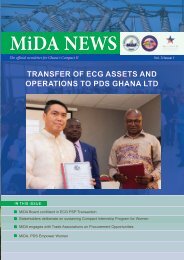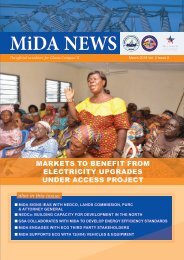MiDA News - maiden edition
The official newsletter for the Ghana Compact II
The official newsletter for the Ghana Compact II
You also want an ePaper? Increase the reach of your titles
YUMPU automatically turns print PDFs into web optimized ePapers that Google loves.
Millennium Development Authority Quarterly <strong>News</strong>letter Vol. 1<br />
COMPACT 2 PROJECTS<br />
& CROSS-CUTTING ACTIVITIES<br />
ENVIRONMENT & SOCIAL PERFORMANCE<br />
The objective of the environmental and social<br />
performance of the Ghana Power compact<br />
is to develop, adopt and implement a set of<br />
good environmental and social management systems<br />
consistent with best practice. This is critical for<br />
ensuring smooth running of project activities and<br />
avoids delays. It safeguards the safety and security<br />
of workers and the inhabitants of the affected<br />
communities, ensures cost effectiveness of planned<br />
interventions, achieves the buy-in of all key<br />
stakeholders and promotes sustainable development<br />
of planned interventions. It is again required by law<br />
to ensure all compact funded projects and activities<br />
comply with the applicable national laws and<br />
regulations of Ghana.<br />
To this end, <strong>MiDA</strong> shall ensure that all projects are<br />
developed and implemented consistent with the<br />
requirements of the following: Ghana’s EPA laws and<br />
regulations (Act 490, 1994), applicable social and<br />
labor laws of Ghana, MCC environmental<br />
guidelines, MCC health and safety policy, MCC gender<br />
policy, and International Finance Corporation (IFC)<br />
performance standards on environment and social<br />
sustainability.<br />
The project design will ensure that the principles<br />
of environmental and social soundness are adhered<br />
to at all times. This will be achieved by ensuring<br />
project design considers all possible alternatives<br />
with respect to the siting of power substations and<br />
routing of distribution lines. This will help minimize<br />
potential environmental, health and safety impact on<br />
affected communities and reduce cost with respect<br />
to economic and social displacement of projectaffected<br />
persons. <strong>MiDA</strong> will ensure that closer and<br />
effective collaboration is promoted between<strong>MiDA</strong><br />
and all relevant stakeholders at the project design<br />
stage.<br />
Finally, Site-specific Environmental and Social<br />
Impact Assessments (ESIA) will be developed for<br />
all activities identified as having the potential to<br />
adversely impact on the environment.<br />
Subsequent to this, relevant, adequate and site-specific<br />
Environmental and Social Management Plans<br />
(ESMP), Resettlement Action Plans (RAPs), Health<br />
and Safety Management Plans (HSMP) will be<br />
developed and implemented to mitigate and monitor<br />
risk associated with infrastructural activities.<br />
COMPACT 2 PROJECTS<br />
& CROSS-CUTTING ACTIVITIES<br />
MONITORING & EVALUATION & ECONOMICS (M&EE)<br />
A<br />
focus on results is at the heart of the<br />
Millennium Challenge Corporation (MCC)<br />
development model. As a result, Monitoring<br />
and Evaluation (M&E) is an important component<br />
of program design and is incorporated into all facets<br />
of <strong>MiDA</strong>’s program.As with all MCA programs, the<br />
M&E work is guided by the MCC M&E Policy. For<br />
<strong>MiDA</strong> specifically, there is the M&E Plan which has<br />
been developed taking into account this Policy.<br />
The overarching objective of <strong>MiDA</strong> M&E<br />
activities is to enhance the generation of good quality<br />
Monitoring and Evaluation evidence, which will be<br />
integrated into <strong>MiDA</strong> and MCC decision making<br />
processes to provide greater accountability and<br />
strong evidence based decision making and learning.<br />
The monitoring of Projects is to determine whether<br />
Projects are on track to achieve their<br />
intended results, while the evaluation of<br />
implementation strategies is to provide<br />
lessons learned, determine cost effectiveness and<br />
estimate the impact of Compact interventions.<br />
The monitoring involves working with project teams<br />
and the implementing entities (relevant Ministries,<br />
Departments and Agencies) to continuously and<br />
systematically collect data on specified indicators<br />
in the M&E Plan to provide indications of progress<br />
towards objectives and the achievement of intermediate<br />
results along the way. Evaluation of activities/<br />
projects are carried out by independent evaluators<br />
who are hired by MCC.<br />
11












